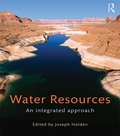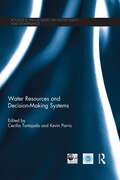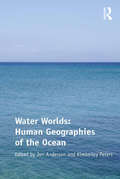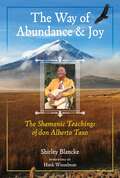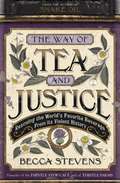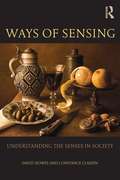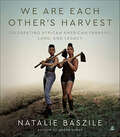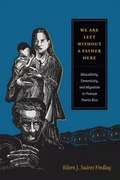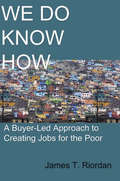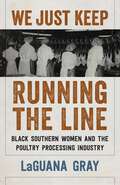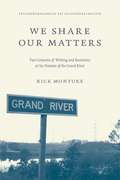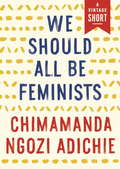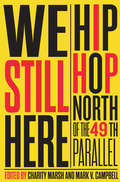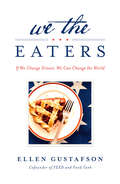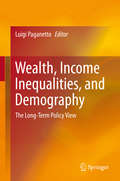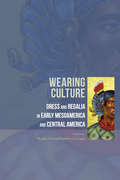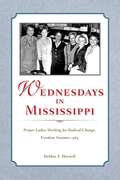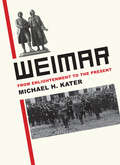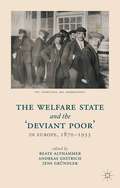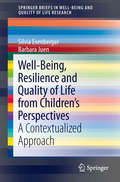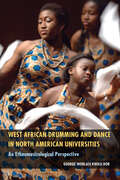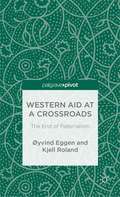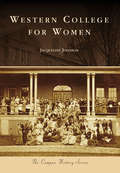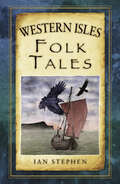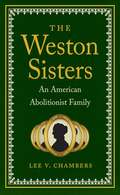- Table View
- List View
Water Resources: An Integrated Approach
by Joseph HoldenThe world faces huge challenges for water as population continues to grow, as emerging economies develop and as climate change alters the global and local water cycle. There are major questions to be answered about how we supply water in a sustainable and safe manner to fulfil our needs, while at the same time protecting vulnerable ecosystems from disaster. Water Resources: An Integrated Approach provides students with a comprehensive overview of both natural and socio-economic processes associated with water. The book contains chapters written by 20 specialist contributors, providing expert depth of coverage to topics. The text guides the reader through the topic of water starting with its unique properties and moving through environmental processes and human impacts upon them including the changing water cycle, water movement in river basins, water quality, groundwater and aquatic ecosystems. The book then covers management strategies for water resources, water treatment and re-use, and the role of water in human health before covering water economics and water conflict. The text concludes with a chapter that examines new concepts such as virtual water that help us understand current and future water resource use and availability across interconnected local and global scales. This book provides a novel interdisciplinary approach to water in a changing world, from an environmental change perspective and inter-related social, political and economic dimensions. It includes global examples from both the developing and developed world. Each chapter is supplemented with boxed case studies, end of chapter questions, and further reading, as well as a glossary of terms. The text is richly illustrated throughout with over 150 full colour diagrams and photos.
Water Resources and Decision-Making Systems (Routledge Special Issues on Water Policy and Governance)
by Cecilia Tortajada Kevin ParrisWater data and information are essential to support efforts to understand, manage, allocate, utilize and protect water resources. The linkages between Water Information Systems and needs of decision makers are complex, but can be encapsulated in a Driving Force (Policy Needs) – Monitoring – Data Management – Reporting framework. The rapid development in water policy reforms in many sectors and growing emphasis on demand-side policy solutions to water resources management has created an information imbalance. This imbalance can be characterised in terms of an inverted pyramid with implementation of many water policy initiatives supported by little data and information, especially related to economic and financial elements, to help guide decision makers toward more effective and efficient water resources management strategies. Additionally, as stress and demands on water systems increase and water becomes a more valued resource, this tends to increase the value of water information both for water providers and users. Nevertheless, many countries are reporting that the capacity to collect water information is being undermined by a lack of resources, while expertise to collect, analyse and interpret water data for decision makers is being lost. Finally, the impact of climate change on hydrological regimes represents a key potential stress on water systems. This issue could be the catalyst for adapting policies to provide more efficient and effective use and management of water resources and advance institutional and governance reforms in the water sector.This book is based on a special issue of the International Journal of Water Resources Development.
Water Worlds: Human Geographies Of The Oceans
by Jon Anderson Kimberley PetersOur world is a water world. Seventy percent of our planet consists of ocean. However, geography has traditionally overlooked this vital component of the earth's composition. The word 'geography' directly translates as 'earth writing' and in line with this definition the discipline has preoccupied itself with the study of terrestrial spaces of society and nature. This book challenges human geography's preoccupation with the terrestrial, investigating the terra incognita of the seas and oceans. Linking to new theoretical debates shaping the geographic discipline (such as affect, assemblage, emotion, hybridity and the more-than-human), this volume unlocks new knowledge concerning the human geographies of ocean space. The book casts adrift stable, bounded and fixed conceptions of space and advances geographical understanding based on the world as 'becoming', changing, mobile and processional. This ontology supports the notion that the oceans are not simply fluid in a literal way, but also in a conceptual sense, suggesting that the seas have their own fluid natures - their own capacities and agencies - which are co-fabricated with social and cultural life. This book features twelve chapters, authored by key academics contributing to this growing field of research. The book is divided into three sections, including an Introduction by the editors and a foreword by Prof. Philip E. Steinberg, the leading scholar in the field of maritime geographies. The first section of the book considers the ways in which different watery spaces from the Atlantic Ocean to the Mediterranean Sea have been conceptualized, theorized and ’known’ through metaphors, voyages of discovery and scientific endeavour. The second section examines how oceans are experienced; through various activities including driving on water, kayaking in water and diving under water. The final section explores the relations between human life and the nature of the sea as a material, mobile and more-than-human spa
The Way of Abundance and Joy: The Shamanic Teachings of don Alberto Taxo
by Shirley Blancke• Shows how to relate to and receive help from the elements, reconnect with nature to access abundance and joy, connect with plants, animals, water, air, and fire • Explores don Alberto&’s upbringing in a family of yachaks, his initiation, and his personal work to fulfill the Andean prophecy of the Eagle and the Condor • Includes reflections and essays from several of don Alberto&’s students and others who have worked with him, including Itzhak Beery and John Perkins Recognized as a master yachak, don Alberto Taxo is a celebrated spiritual elder, shaman, and healer of the pre-Inca Atik (Kichwa) people from the Andes Mountains of Ecuador. He has been sharing ancient Andean shamanic wisdom and practices in the United States for more than 20 years--his personal quest to fulfill the Andean prophecy that the Eagle and the Condor will fly together in the same sky in harmony. Written with don Alberto&’s permission and as further fulfillment of the Eagle-Condor prophecy, this book shares don Alberto&’s teachings and his simple approaches for building a reciprocal relationship with nature, centered on Sumak Kausay, the way of joy and abundance. As a yachak, a shaman of the elements, don Alberto shows how to relate to and receive help from nature. When we are connected with nature on an emotional and spiritual level it creates joy that is deeply healing and can be accessed during life&’s difficulties. The book discusses traditional Ecuadorian shamanic beliefs and practices, including Andean Inca cosmology; how to connect with plants, animals, air, fire, and water in sacred springs, the ocean, or your shower; and Inca concepts like Pacha, the space-time era in which we live that is now transitioning to a new one of connection and love after 500 years. The book explores don Alberto&’s upbringing in a family of yachaks, his initiation, and his assumption of the role of shaman for his community. It also includes reflections and essays from don Alberto&’s students and others who have worked with him, including shamanic teachers Itzhak Beery and John Perkins, showing how he influenced their lives and awakened them to the path of Sumak Kausay, Abundant Life.
The Way of Tea and Justice: Rescuing the World's Favorite Beverage from Its Violent History
by Becca StevensWhat started as an impossible dream-to build a café that employs women recovering from prostitution and addiction-is helping to fuel an astonishing movement to bring freedom and fair wages to women producers worldwide where tea and trafficking are linked by oppression and the opiate wars. Becca Stevens started the Thistle Stop Café to empower women survivors. But when she discovered a connection between café workers and tea laborers overseas, she embarked on a global mission called "Shared Trade" to increase the value of women survivors and producers across the globe. As she recounts the victories and unexpected challenges of building the café, Becca also sweeps the reader into the world of tea, where timeless rituals transport to an era of beauty and the challenging truths about tea's darker, more violent history. She offers moving reflections of the meaning of tea in our lives, plus recipes for tea blends that readers can make themselves. In this journey of triumph for impoverished tea laborers, hope for café workers, and insight into the history of tea, Becca sets out to defy the odds and prove that love is the most powerful force for transformation on earth.
Ways of Sensing: Understanding the Senses In Society
by Constance Classen David HowesWays of Sensing is a stimulating exploration of the cultural, historical and political dimensions of the world of the senses. The book spans a wide range of settings and makes comparisons between different cultures and epochs, revealing the power and diversity of sensory expressions across time and space. The chapters reflect on topics such as the tactile appeal of medieval art, the healing power of Navajo sand paintings, the aesthetic blight of the modern hospital, the role of the senses in the courtroom, and the branding of sensations in the marketplace. Howes and Classen consider how political issues such as nationalism, gender equality and the treatment of minority groups are shaped by sensory practices and metaphors. They also reveal how the phenomenon of synaesthesia, or mingling of the senses, can be seen as not simply a neurological condition but a vital cultural mode of creating social and cosmic interconnections. Written by leading scholars in the field, Ways of Sensing provides readers with a valuable and engaging introduction to the life of the senses in society.
We Are Each Other's Harvest: Celebrating African American Farmers, Land, and Legacy
by Natalie BaszileA WALL STREET JOURNAL FAVORITE FOOD BOOK OF THE EARFrom the author of Queen Sugar—now a critically acclaimed series on OWN directed by Ava Duvernay—comes a beautiful exploration and celebration of black farming in America. In this impressive anthology, Natalie Baszile brings together essays, poems, photographs, quotes, conversations, and first-person stories to examine black people’s connection to the American land from Emancipation to today. In the 1920s, there were over one million black farmers; today there are just 45,000. Baszile explores this crisis, through the farmers’ personal experiences. In their own words, middle aged and elderly black farmers explain why they continue to farm despite systemic discrimination and land loss. The "Returning Generation"—young farmers, who are building upon the legacy of their ancestors, talk about the challenges they face as they seek to redress issues of food justice, food sovereignty, and reparations. These farmers are joined by other influential voices, including noted historians Analena Hope Hassberg and Pete Daniel, and award-winning author Clyde W. Ford, who considers the arrival of Africans to American shores; and James Beard Award-winning writers and Michael Twitty, reflects on black culinary tradition and its African roots. Poetry and inspirational quotes are woven into these diverse narratives, adding richness and texture, as well as stunning four-color photographs from photographers Alison Gootee and Malcom Williams, and Baszile’s personal collection. As Baszile reveals, black farming informs crucial aspects of American culture—the family, the way our national identity is bound up with the land, the pull of memory, the healing power of food, and race relations. She reminds us that the land, well-earned and fiercely protected, transcends history and signifies a home that can be tended, tilled, and passed to succeeding generations with pride. We Are Each Other’s Harvest elevates the voices and stories of black farmers and people of color, celebrating their perseverance and resilience, while spotlighting the challenges they continue to face. Luminous and eye-opening, this eclectic collection helps people and communities of color today reimagine what it means to be dedicated to the soil.
We Are Left without a Father Here: Masculinity, Domesticity, and Migration in Postwar Puerto Rico
by Eileen J. FindlayWe Are Left without a Father Here is a transnational history of working people's struggles and a gendered analysis of populism and colonialism in mid-twentieth-century Puerto Rico. At its core are the thousands of agricultural workers who, at the behest of the Puerto Rican government, migrated to Michigan in 1950 to work in the state's sugar beet fields. The men expected to earn enough income to finally become successful breadwinners and fathers. To their dismay, the men encountered abysmal working conditions and pay. The migrant workers in Michigan and their wives in Puerto Rico soon exploded in protest. Chronicling the protests, the surprising alliances that they created, and the Puerto Rican government's response, Eileen J. Suárez Findlay explains that notions of fatherhood and domesticity were central to Puerto Rican populist politics. Patriarchal ideals shaped citizens' understandings of themselves, their relationship to Puerto Rican leaders and the state, as well as the meanings they ascribed to U.S. colonialism. Findlay argues that the motivations and strategies for transnational labor migrations, colonial policies, and worker solidarities are all deeply gendered.
We Do Know How: A Buyer-Led Approach to Creating Jobs for the Poor
by James T. RiordanAn insider with practical experience in development work reveals how understanding market realities can more effectively reduce poverty.This book by a practitioner—not an academic, government official, or pundit—has been written for practitioners and offers fresh thinking on how to do international development work. It combines that thinking with practical guidance, in plain English, on what to do—and perhaps just as importantly, what not to do—on the ground. We Do Know How takes buzzwords commonly used in development circles—demand-driven, results-oriented, accountability, and others—and makes them real, spelling out a proven approach for expanding business sales and generating jobs for poor people.Although government has a role to play in development, in the end the actions of businesses drive economic growth and expand people’s incomes. We Do Know How shows how to build on the incentives that drive businesses and, in the process, create jobs for the poor. Specifically, it urges development practitioners to support only those business opportunities for which there is market demand, abiding by the maxim “produce what you can sell,” not “sell what you produce.” More than that, it cautions practitioners not to become solutions looking for problems but to search creatively for ways to solve the specific problems that stand most in the way of clients meeting buyers’ requirements.We Do Know How challenges much conventional wisdom on how to do development work. At the same time, and in contrast to other books on development, it shows how, by maintaining focus and discipline, development practitioners can deliver demonstrable increases in jobs for those who need them.
We Just Keep Running the Line: Black Southern Women and the Poultry Processing Industry
by LaGuana GrayThe poultry processing industry in El Dorado, Arkansas, was an economic powerhouse in the latter half of the twentieth century. It was the largest employer in the interconnected region of South Arkansas and North Louisiana surrounding El Dorado, and the fates of many related companies and farms depended on its continued financial success. We Just Keep Running the Line is the story of the rise of the poultry processing industry in El Dorado and the labor force -- composed primarily of black women -- upon which it came to rely.At a time when agricultural jobs were in decline and Louisiana stood at the forefront of rising anti-welfare sentiment, much of the work available in the area went to men, driving women into less attractive, labor-intensive jobs. LaGuana Gray argues that the justification for placing African American women in the lowest-paying and most dangerous of these jobs, like poultry processing, derives from longstanding mischaracterizations of black women by those in power. In evaluating the perception of black women as "less" than white women -- less feminine, less moral, less deserving of social assistance, and less invested in their families' and communities' well-being -- Gray illuminates the often-exploitative nature of southern labor, the growth of the agribusiness model of food production, and the role of women of color in such food industries.Using collected oral histories to allow marginalized women of color to tell their own stories and to contest and reshape narratives commonly used against them, We Just Keep Running the Line explores the physical and psychological toll this work took on black women, analyzing their survival strategies and their fight to retain their humanity in an exploitative industry.
We Share Our Matters: Two Centuries of Writing and Resistance at Six Nations of the Grand River
by Rick MontureThe Haudenosaunee, more commonly known as the Iroquois or Six Nations, have been one of the most widely written-about Indigenous groups in the United States and Canada. But seldom have the voices emerging from this community been drawn on in order to understand its enduring intellectual traditions. Rick Monture’s We Share Our Matters offers the first comprehensive portrait of how the Haudenosaunee of the Grand River region have expressed their long struggle for sovereignty in Canada. Drawing from individualsas diverse as Joseph Brant, Pauline Johnson and Robbie Robertson, Monture illuminates a unique Haudenosaunee world view comprised of three distinct features: a spiritual belief about their role and responsibility to the earth; a firm understanding of their sovereign status as a confederacy of independant nations; and their responsibility to maintain those relations for future generations. After more than two centuries of political struggle Haudenosaunee thought has avoided stagnant conservatism and continues to inspire ways to address current social and political realities.
We Should All Be Feminists (A Vintage Short)
by Chimamanda Ngozi AdichieAn eBook short.What does "feminism" mean today? That is the question at the heart of We Should All Be Feminists, a personal, eloquently-argued essay--adapted from her much-viewed Tedx talk of the same name--by Chimamanda Ngozi Adichie, the award-winning author of Americanah and Half of a Yellow Sun. With humor and levity, here Adichie offers readers a unique definition of feminism for the twenty-first century--one rooted in inclusion and awareness. She shines a light not only on blatant discrimination, but also the more insidious, institutional behaviors that marginalize women around the world, in order to help readers of all walks of life better understand the often masked realities of sexual politics. Throughout, she draws extensively on her own experiences--in the U.S., in her native Nigeria, and abroad--offering an artfully nuanced explanation of why the gender divide is harmful for women and men, alike. Argued in the same observant, witty and clever prose that has made Adichie a bestselling novelist, here is one remarkable author's exploration of what it means to be a woman today--and an of-the-moment rallying cry for why we should all be feminists.
We Still Here: Hip Hop North of the 49th Parallel
by Charity Marsh and Mark V. CampbellWe Still Here maps the edges of hip-hop culture and makes sense of the rich and diverse ways people create and engage with hip-hop music within Canadian borders. Contributors to the collection explore the power of institutions, mainstream hegemonies, and the processes of historical formation in the evolution of hip-hop culture. Throughout, the volume foregrounds the generative issues of gender, identity, and power, in particular in relation to the Black diaspora and Indigenous cultures. The contributions of artists in the scene are front and centre in this collection, exposing the distinct inner mechanics of Canadian hip hop from a variety of perspectives. By amplifying rarely heard voices within hip-hop culture, We Still Here argues for its power to disrupt national formations and highlights the people and communities who make hip hop happen.
We the Eaters: If We Change Dinner, We Can Change the World
by Ellen GustafsonThe implausible truth: Over one billion people in the world are hungry and over one billion are overweight. Far from complete opposites, hunger and obesity are in fact different manifestations of the same problem: It's increasingly difficult to find and eat nutritious food. By examining the global industrial food system using the deceptively simple template of a classic American dinner, We the Eaters not only outlines the root causes of this bizarre and troubling dichotomy but also provides a blueprint of actionable solutions—solutions that could start with changing out just a single item on your plate. From your burger to your soda, Gustafson unpacks how even the hyperlocal can cause worldwide ripples. For instance: American agricultural policy promoting corn and soybeans in beef farming means we feed more to cows than to hungry people. This is compounded by the environmental cost of factory livestock farming, rising obesity rates, and the false economics of unhealthfully high meat consumption.The answer? Eat a hamburger—just make it a smaller, sustainably raised, grass-fed one. Gustafson—a young entrepreneur, foreign policy expert, and food policy advocate—delivers a wake-up call that will inspire even the most passive reader to take action. We can love our food and our country while being better stewards of our system and our health. We the Eaters is nothing short of a manifesto: If we change dinner, we really can change the world.
Wealth, Income Inequalities, and Demography
by Luigi PaganettoIn this book, leading experts take a long-term view of the trends and policies of most relevance in achieving the structural readjustment required by the current crisis, which for too long has been viewed merely as an economic recession. A wide variety of issues are addressed, including the implications of the massive movement of wealth from advanced countries to emerging ones and the increasing income inequality evident within many countries. Prospects for growth toward the mid-century and beyond are discussed, with consideration of lessons from the past and the impact of various constraints, including corruption. The policies and reforms required to restore economic dynamism within the EU and more generally, to foster the "Good Economy" are discussed, recognizing the need for measures to promote innovation, entrepreneurship, well-being and high levels of environmental performance. The book comprises a selection of contributions presented at the XXV Villa Mondragone International Economic Seminar. For the past quarter of a century, this seminar has brought together leading experts to engage in debates on pressing economic questions. This book, based on the most recent gathering, will be of interest to all who are concerned about the challenges to growth, well-being and social inclusion that will have to be confronted in the coming decades.
Wearing Culture: Dress and Regalia in Early Mesoamerica and Central America
by Heather S. OrrWearing Culture connects scholars of divergent geographical areas and academic fields—from archaeologists and anthropologists to art historians—to show the significance of articles of regalia and of dressing and ornamenting people and objects among the Formative period cultures of ancient Mesoamerica and Central America. Documenting the elaborate practices of costume, adornment, and body modification in Panama, Costa Rica, Nicaragua, Honduras, Oaxaca, the Soconusco region of southern Mesoamerica, the Gulf Coast Olmec region (Olman), and the Maya lowlands, this book demonstrates that adornment was used as a tool for communicating status, social relationships, power, gender, sexuality, behavior, and political, ritual, and religious identities. Despite considerable formal and technological variation in clothing and ornamentation, the early indigenous cultures of these regions shared numerous practices, attitudes, and aesthetic interests. Contributors address technological development, manufacturing materials and methods, nonfabric ornamentation, symbolic dimensions, representational strategies, and clothing as evidence of interregional sociopolitical exchange. Focusing on an important period of cultural and artistic development through the lens of costuming and adornment, Wearing Culture will be of interest to scholars of pre-Hispanic and pre-Columbian studies.
Wednesdays in Mississippi: Proper Ladies Working for Radical Change, Freedom Summer 1964
by Debbie Z. HarwellAs tensions mounted before Freedom Summer, one organization tackled the divide by opening lines of communication at the request of local women: Wednesdays in Mississippi (WIMS). Employing an unusual and deliberately feminine approach, WIMS brought interracial, interfaith teams of northern middle-aged, middle- and upper-class women to Mississippi to meet with their southern counterparts. Sponsored by the National Council of Negro Women (NCNW), WIMS operated on the belief that the northern participants' gender, age, and class would serve as an entrée to southerners who had dismissed other civil rights activists as radicals. The WIMS teams' respectable appearance and quiet approach enabled them to build understanding across race, region, and religion where other overtures had failed. The only civil rights program created for women by women as part of a national organization, WIMS offers a new paradigm through which to study civil rights activism, challenging the stereotype of Freedom Summer activists as young student radicals and demonstrating the effectiveness of the subtle approach taken by "proper ladies." The book delves into the motivations for women's civil rights activism and the role religion played in influencing supporters and opponents of the civil rights movement. Lastly, it confirms that the NCNW actively worked for integration and black voting rights while also addressing education, poverty, hunger, housing, and employment as civil rights issues. After successful efforts in 1964 and 1965, WIMS became Workshops in Mississippi, which strived to alleviate the specific needs of poor women. Projects that grew from these efforts still operate today.
Weimar
by Michael H. KaterHistorian Michael H. Kater chronicles the rise and fall of one of Germany's most iconic cities in this fascinating and surprisingly provocative history of Weimar. Weimar was a center of the arts during the Enlightenment and hence the cradle of German culture in modern times. Goethe and Schiller made their reputations here, as did Franz Liszt and the young Richard Strauss. In the early twentieth century, the Bauhaus school was founded in Weimar. But from the 1880s on, the city also nurtured a powerful right-wing reactionary movement, and fifty years later, a repressive National Socialist regime dimmed Weimar's creative lights, transforming the onetime artists' utopia into the capital of its first Nazified province and constructing the Buchenwald death camp on its doorstep. Kater's richly detailed volume offers the first complete history of Weimar in any language, from its meteoric eighteenth-century rise up from obscurity through its glory days of unbridled creative expression to its dark descent back into artistic insignificance under Nazi rule and, later, Soviet occupation and beyond.
The Welfare State and the ‘Deviant Poor’ in Europe, 1870–1933
by Beate Althammer Andreas Gestrich Jens GründlerThe strife for social improvement that arose in the decades around the turn of the 20th century raised the issue of social conformity in new ways: how were citizens who did not adhere to the rules to be dealt with? This edited collection opens new perspectives on the history of the emerging welfare state by focusing on its margins.
Well-Being, Resilience and Quality of Life from Children's Perspectives
by Silvia Exenberger Barbara JuenThis book explores the broad view on child well-being and the quality of life research. It starts with a discussion of the origin of the social indicator movement and a review of literature on the concepts of quality of life, (subjective) well-being and resilience. It then discusses the force of culture on child development, and shows how two prototypical environments favor either the independent or interdependent self-model. After an exploration of the shifts and changes in the child well-being indicator movement and trends of child well-being measurements, the book turns to research on Tsunami-affected children. The first part of the study gives these children and their caregivers a voice, formulating in their words what constitutes child well-being for them in the given circumstances. The concepts provided are processed in detail, contrasted, and then made into indicators. The second part of the study describes the introduction of a child well-being index based on these indicators. The book ends with four main conclusions reflected in a theoretical model of contextualized child well-being indicators.
West African Drumming and Dance in North American Universities: An Ethnomusicological Perspective
by George Worlasi DorMore than twenty universities and twenty other colleges in North America (USA and Canada) offer performance courses on West African ethnic dance drumming. Since its inception in 1964 at both UCLA and Columbia, West African drumming and dance has gradually developed into a vibrant campus subculture in North America. The dances most practiced in the American academy come from the ethnic groups Ewe, Akan, Ga, Dagbamba, Mande, and Wolof, thereby privileging dances mostly from Ghana, Togo, Benin, Senegal, Mali, Guinea, and Burkina Faso. This strong presence and practice of a world music ensemble in the diaspora has captured and engaged the interest of scholars, musicians, dancers, and audiences. In the first-ever ethnographic study of West African drumming and dance in North American universities, the author documents and acknowledges ethnomusicologists, ensemble directors, students, administrators, and academic institutions for their key roles in the histories of their respective ensembles. Dor collates and shares perspectives including debates on pedagogical approaches that may be instructive as models for both current and future ensemble directors and reveals the multiple impacts that participation in an ensemble or class offers students. He also examines the interplay among historically situated structures and systems, discourse, and practice, and explores the multiple meanings that individuals and various groups of people construct from this campus activity. The study will be of value to students, directors, and scholars as an ethnographic study and as a text for teaching relevant courses in African music, African studies, ethnomusicology/world music, African diaspora studies, and other related disciplines.
Western Aid at a Crossroads: The End of Paternalism
by Øyvind Eggen Kjell RolandPoor countries do not need Western guidance, but can make good use of Western resources. Eggen and Roland demonstrate how aid must be re-invented to become relevant to future development.
Western College for Women (Campus History)
by Jacqueline JohnsonWestern Female Seminary, the first daughter institution of Mount Holyoke College, opened its doors in 1855 as a Christian institution. The seminary, which became Western College for Women, was founded on the Mt. Holyoke plan, with a strong emphasis on academics. Many of its graduates in the 19th century served as home and foreign missionaries, and by the 20th century, young women from many foreign countries attended Western. In the 1950s, the curriculum was expanded to include a strong international emphasis. Western was the first college in the country to have an artist-in-residence, when composer Edgar Stillman Kelley was invited to live on campus. Western attracted national attention when it hosted civil rights training for Freedom Summer 1964. In the 1970s, independent study programs were developed, and the college became coeducational. With its diverse architecture and the early emphasis on landscaping on its rolling campus, the college was listed in the National Register of Historic Places in 1979.
Western Isles Folk Tales (Folk Tales: United Kingdom)
by Ian StephenWestern Isles Folk Tales is a representative collection of stories from the geographical span of the long chain of islands known as the Outer Hebrides. Some are well-known tales and others have been sought out by the author, but all are retold in the natural voice of a local man. You will find premonitions, accounts of uncanny events and mythical beings, such as the blue men of the stream who test mariners venturing into the tidal currents around the Shiant Islands. Also included are tales from islands now uninhabited, like the archipelago of St Kilda, in contrast to the witty yarns from bustling harbours. The author was the inaugural winner of the Robert Louis Stevenson Fellowship (1995) and his Acts of Trust collaboration with visual artist Christine Morrison won the multi-arts category in the first British Awards for Storytelling Excellence (2012). Both author and illustrator live in Stornoway, Isle of Lewis.
The Weston Sisters
by Lee V. ChambersThe Westons were among the most well-known abolitionists in antebellum Massachusetts, and each of the Weston sisters played an integral role in the family's work. The eldest, Maria Weston Chapman, became one of the antislavery movement's most influential members. In an extensive and original look at the connections among women, domesticity, and progressive political movements, Lee V. Chambers argues that it was the familial cooperation and support between sisters, dubbed "kin-work," that allowed women like the Westons to participate in the political process, marking a major change in women's roles from the domestic to the public sphere. The Weston sisters and abolitionist families like them supported each other in meeting the challenges of sickness, pregnancy, child care, and the myriad household responsibilities that made it difficult for women to engage in and sustain political activities.By repositioning the household and family to a more significant place in the history of American politics, Chambers examines connections between the female critique of slavery and patriarchy, ultimately arguing that it was family ties that drew women into the activism of public life and kept them there.
